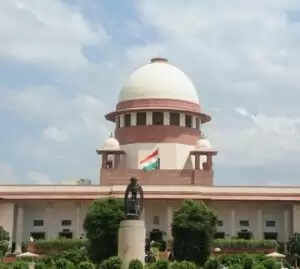Supreme Court to Review Controversial Waqf Amendment Act: What’s at Stake?
Supreme Court Set to Hear Waqf Amendment Act Challenges

Next week, the Supreme Court will deliberate on multiple petitions questioning the constitutional legitimacy of the Waqf (Amendment) Act, 2025. According to the court's schedule, a panel led by Chief Justice Sanjeev Khanna, along with Justices Sanjay Kumar and K.V. Viswanathan, will address the issue on April 16.
Numerous petitions have been submitted to the Supreme Court, challenging the recent changes made to the Waqf Act of 1995.
On Wednesday, the Hindu Sena submitted an application to intervene in the case, expressing support for the Waqf (Amendment) Act, 2025. The application argues that the previous provisions of the Waqf Act, 1995, adversely affected the rights of non-Muslims, as outlined in Sections 3 and 40, which allowed the Waqf board to claim properties belonging to non-Muslims.
The application further claims that the amendments will ensure justice for non-Muslims whose properties have been wrongfully appropriated as waqf properties.
Following the passage of the legislation in both Houses of Parliament last week, the Congress party announced plans to contest the Waqf (Amendment) Bill, now an Act after receiving presidential approval. They argue that it undermines the Constitution's foundational principles and seeks to create divisions based on religion. Conversely, the government asserts that this legislation will benefit millions of impoverished Muslims without harming any individual.
Minority Affairs Minister Kiren Rijiju emphasized that the new law does not interfere with existing Waqf properties, reiterating the government's commitment to the principle of 'Sabka Saath and Sabka Vikas.'
Congress MP Mohammad Jawed has filed a petition claiming that the amendments infringe upon several constitutional rights, including Articles 14 (equality), 25 (freedom of religion), 26 (management of religious affairs), 29 (minority rights), and 300A (property rights).
Similarly, Asaduddin Owaisi, leader of the All India Majlis-e-Ittehadul Muslimeen (AIMIM), has approached the Supreme Court, arguing that the amendments violate multiple constitutional provisions and are fundamentally arbitrary.
Additional petitions have been filed by various groups, including the Association for Protection of Civil Rights, AAP leader Amanatullah Khan, Maulana Arshad Madani from Jamiat Ulema-i-Hind, the All India Muslim Personal Law Board (AIMPLB), the Social Democratic Party of India (SDPI), and others, all contesting the constitutional validity of the Waqf (Amendment) Act, 2025.
The term 'Waqf' is derived from Islamic law and signifies an endowment made by a Muslim for charitable or religious purposes, which can include mosques, educational institutions, hospitals, and other public services.
